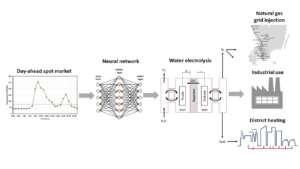Renewable energy technology with emphasis on clean hydrogen and derivatives production processes
Background
Ambitious targets to reduce greenhouse gas emissions combined with reducing costs of solar PV and wind power have been encouraging cross-sectoral decarbonization with clean hydrogen, electrofuels like synthetic methane and methanol as well as green ammonia. Their production processes assisted by carbon capture and storage (CCS) and/or utilization (CCU) will have to become more competitive to be implemented in large scale, thus allowing net zero emissions in the next decades.
Aims
To develop tools for technology assessment and optimization that helps to understand how production plants should be designed and operated in order reduce costs and maximize environmental benefits.
Approaches
Modeling and simulation techniques assisted by artificial intelligence as well as environmental-techno-economic assessments.
Keywords
hydrogen; power-to-gas; variable renewable energy; energy storage; climate impact
Links
Project leaders
Leandro Janke and Åke Nordberg, all from the Department of Energy and Technology of the Swedish University of Agricultural Sciences
Other project members
Sören Weinrich, from the Biochemical Conversion Department of the German Biomass Research Center (DBFZ), and Shane McDonagh of Environmental Research Institute (MaREI) of University College Cork, Per-Anders Hansson, SLU
Other funding agencies
Our research in this area is co-funded mainly from the National Energy Agency and ERA-Net

